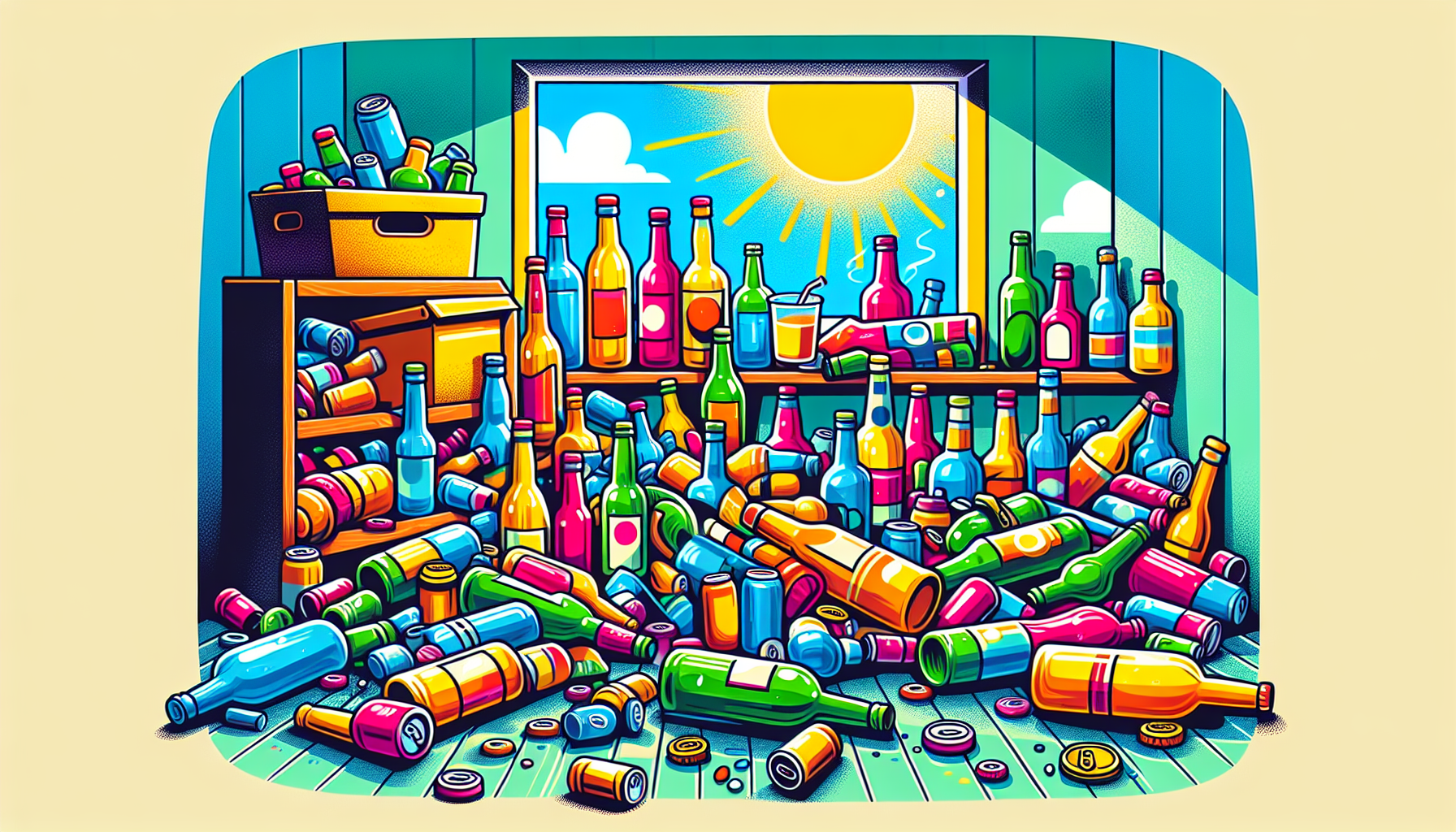How Do You Quit Drinking Alcohol: Top Tips for Success
- Aug 23, 2025
- 13 min read
Wondering how do you quit drinking alcohol? Alcoholism is a recognized medical condition, also known as a substance use disorder, and overcoming it can be challenging—often requiring professional help and support. Start by consulting a healthcare professional to safely manage withdrawal. Next, identify your motivations, set realistic goals, and create an alcohol-free environment. This article covers all the essential steps to help you quit drinking and regain control of your life.
Introduction
Quitting alcohol or reducing your drinking habits can have a profound impact on your overall health, relationships, and mental well-being. Drinking alcohol, especially in excess, can lead to alcohol abuse, alcohol addiction, and a range of problems that affect not only you but also your loved ones. The risks associated with heavy alcohol use include high blood pressure, alcohol use disorder, and other forms of substance abuse, all of which can seriously harm your health. Recognizing these dangers is the first step toward making positive changes.
If you’re considering quitting drinking, know that you’re not alone. Support groups like Alcoholics Anonymous and professional organizations such as American Addiction Centers offer valuable resources and guidance for those struggling with alcohol addiction. Whether you want to quit drinking completely or simply cut back, understanding the effects of alcohol and seeking support can help you regain control and improve your quality of life. Taking the first step toward quitting alcohol is a powerful decision for your health, happiness, and future.
Key Takeaways
Consulting a healthcare professional is essential for safely managing alcohol withdrawal and tailoring an effective recovery plan.
Identifying personal motivations for quitting and setting realistic, achievable goals foster commitment and improve recovery outcomes.
Building a strong support network and utilizing technology can enhance the chances of success in maintaining sobriety.
Consult a Healthcare Professional
When you decide to stop drinking, one of the first and most crucial steps is to consult a healthcare professional. Alcohol withdrawal can be life-threatening, with symptoms starting as early as six hours after your last drink. Severe complications like delirium tremens, which causes disorientation and requires immediate medical attention, can occur. Therefore, having medical supervision enhances safety and prevents severe complications during alcohol withdrawal.
If you are physically dependent or dependent on alcohol, you are at a higher risk for severe withdrawal symptoms. It is dangerous to stop drinking suddenly, as this can lead to serious health issues. Some individuals, especially those with a long history of alcohol misuse, may experience seizures during withdrawal, typically within 6 to 10 hours after their last drink. Medical supervision is essential to manage these risks safely.
A healthcare professional can help you assess your withdrawal symptoms and determine the appropriate level of care. They can create a tailored treatment plan to improve your recovery outcomes.
Whether you choose inpatient or outpatient addiction treatment facilities, these supportive environments offer the necessary care for detoxification and recovery. Remember, seeking medical guidance is especially important if you have a history of complicated withdrawals. Talk openly with your healthcare provider about your drinking habits and any withdrawal symptoms you may be experiencing.
Understanding Your Drinking Habits
Understanding your drinking habits is a crucial first step in quitting alcohol and overcoming alcohol addiction. Start by honestly assessing how much alcohol you consume and when you tend to drink. Tracking your drinking habits—whether in a journal or with a mobile app—can help you spot patterns and triggers that influence your alcohol use. For example, you might notice that you’re more likely to drink when you’re with certain friends, after a stressful day, or during specific social events.
Recognizing these patterns allows you to make informed decisions about how to quit drinking or reduce your alcohol intake. If you find that your social life often revolves around activities that involve drinking, consider exploring new hobbies or spending time with friends who support your goal to quit. By gaining insight into your drinking habits, you can address the underlying reasons for your alcohol use and create a personalized plan to quit drinking and build a healthier lifestyle.
Identify Your Motivations
Understanding why you want to quit drinking is a powerful motivator. Identifying personal reasons for quitting, such as improving relationships, advancing your career, or improving your mood, can significantly enhance your commitment to change. Reflect on how alcohol has impacted your life and consider the healthier, happier future you want without it.
Write down your reasons for quitting and display them where you can see them daily as a constant reminder of your goals. This practice not only reinforces your commitment to sobriety but also instills hope and positivity about the possibilities of a sober life.
Set Realistic Goals
Setting realistic and achievable goals is crucial when you decide to quit drinking. Instead of aiming for one large goal, break it down into smaller, attainable steps. Using the SMART criteria—Specific, Measurable, Achievable, Relevant, and Time-bound—can enhance the effectiveness of your goal-setting.
Short-term goals foster a sense of accomplishment and provide clear direction in your journey to quit drinking. For example, you might set daily abstinence goals, which have been shown to significantly decrease the likelihood of consuming alcohol within the following 24 hours.
Reviewing journal entries helps track your progress and keeps you motivated.
Eliminate Alcohol from Your Environment

Creating an alcohol-free environment is crucial in your journey to sobriety. To support your recovery, remove alcohol from your home to significantly reduce temptation during early recovery. This simple yet powerful action strengthens your commitment to sobriety by minimizing exposure to triggers.
Changing your surroundings helps you avoid situations that involve drinking and creates a space that supports better decision-making. Whether it’s removing alcoholic beverages from your living space or avoiding social events where drinking is the main activity, an alcohol-free environment can help you stop drinking completely and focus on your recovery. Avoiding alcohol in your environment and daily routine can also improve your physical health and overall wellness.
Keep a Journal
Keeping a journal is an invaluable tool in your recovery journey. It helps track your feelings, identify drinking patterns, and compare emotions over time. This practice provides a secure space to express thoughts and emotions without fear of judgment, fostering self-discipline and encouraging commitment to the recovery process.
Regular journaling identifies patterns and triggers for more effective coping strategies. Find a quiet, safe space and write daily. Remember, your entries don’t need to be profound or lengthy; consistency is key.
Journaling is a vital part of your journey towards recovery.
Recognize Triggers and Manage Cravings
Recognizing and managing triggers is essential in maintaining sobriety. Triggers for alcohol cravings can be external, like environments and people, or internal, such as emotions or physical sensations. Identifying these triggers can aid in managing cravings effectively.
Accepting cravings as temporary and managing them without giving in helps maintain sobriety. Coping strategies, such as assertively declining drink offers and challenging thoughts that lead to cravings, reinforce your decision to not drink. Therapy can also provide personalized strategies to cope with triggers and modify harmful drinking behaviors. Joining a support group can offer additional encouragement and practical advice for managing triggers and cravings. Additionally, therapy can help identify and address underlying triggers that contribute to alcohol use, which is essential for preventing relapse.
Build a Support Network
Building a strong support network, including family and friends, is crucial for achieving your alcohol cessation goals. Support from family and friends who respect your choice to be sober can make social interactions more enjoyable and help you feel less isolated during recovery.
Support groups like Alcoholics Anonymous offer community and shared experiences that aid recovery. Additionally, resources like SAMHSA’s National Helpline offer confidential support and referrals for substance use disorders, available 24/7. Surrounding yourself with supportive individuals can significantly increase your likelihood of success.
If you need more support, consider seeking out additional resources such as online communities, websites, or apps to help you on your journey.
Develop a Plan for Cravings
A pre-planned strategy is crucial for effectively handling alcohol cravings. Common emotions during cravings include anxiety, fear, and shame, which are managed more effectively with a solid plan.
Actively engage your support system, as they can provide help during cravings. Create an action plan with your support system to manage cravings, ensuring you have a reliable method to handle these challenging moments.
Explore New Hobbies and Interests
Exploring new hobbies and interests can be an effective way to distract yourself from wanting to drink and promote relaxation and wellness. Activities like gardening, cycling, cooking, or learning to play an instrument can replace the time spent drinking and enhance personal growth during recovery. You can spend time discovering new interests and relaxing in healthy ways, which supports your journey toward sobriety.
Community service or volunteering can also provide a sense of fulfillment and connection after quitting alcohol. Distracting yourself with healthy activities serves as a practical coping method during cravings and helps you discover who you are without alcohol.
Drinking Habits Replacement
Replacing old drinking habits with healthier alternatives is a powerful way to support your journey toward quitting alcohol. When you stop drinking, it’s important to fill the time and emotional space that alcohol once occupied with positive activities. Engaging in new hobbies—such as exercising, reading, cooking, or learning a new skill—can provide a sense of accomplishment and help distract you from cravings.
Building a strong support network of friends and family who encourage your decision to quit drinking can make a significant difference. Surround yourself with people who support your goals and are willing to participate in activities that don’t involve alcohol. Additionally, finding healthy ways to manage stress and emotions, like practicing yoga, meditation, or talking to a therapist, can help you cope without turning to alcohol. For instance, if you used to drink to unwind after work, try going for a walk, listening to music, or practicing deep breathing exercises instead. By replacing drinking habits with healthier alternatives, you’ll reduce your risk of relapse and improve your overall well-being.
Seek Professional Therapy
Professional therapy is crucial for addressing underlying mental health issues and providing the necessary tools for long-term recovery. Common mental health disorders linked to excessive alcohol use and alcohol abuse, as well as related issues such as substance abuse and substance use disorder, include PTSD, anxiety, depression, ADHD, and alcohol use disorder. Therapists use cognitive-behavioral techniques to help clients manage their alcohol use effectively.
Family therapy enhances recovery by improving relationships and the support system of individuals. Therapeutic interventions significantly increase the likelihood of sustained sobriety, making them essential in your recovery journey.
If you’re struggling to quit alcohol, professional support can provide access to individual treatment and expert assistance for alcohol addiction.
Understand the Health Benefits of Quitting

Quitting alcohol leads to significant health improvements like enhanced liver function, better brain health, and improved nutrient absorption. Stopping drinking benefits the body’s organs and systems, including strengthening the immune system. Alcohol can have a harmful effect on the body, impairing immune system function and increasing the risk of illness. Binge drinking, defined as consuming a large number of drinks in one sitting (typically five or more for men, four or more for women), is associated with greater health risks and a higher likelihood of developing alcohol use disorder. It can also help improve existing health issues such as high blood pressure and depression.
Stopping alcohol consumption decreases the risk of injuries and accidents and reduces the risk of several types of cancer. Additionally, quitting drinking is associated with improved sleep quality, increased energy levels, and weight loss by removing the caloric intake associated with drinking alcohol. Quitting alcohol can also enhance brain function and mental clarity. If you want to improve your health, consider ways to stop drinking alcohol.
Overall, eliminating alcohol from your life boosts your physical health, increases happiness, and contributes to better overall wellbeing.
Use Technology for Support
Incorporating technology into your recovery journey can enhance your chances of success. Websites and apps can help track your sobriety progress and provide useful resources for those quitting drinking.
Many of these resources also connect you with online support communities where you can share experiences and gain encouragement. Using these technological tools can strengthen your commitment and provide daily motivation to stay sober.
Prepare for Social Situations
Social situations can be challenging when you’re trying to quit. Having a good time with friends who drink can make it hard to abstain from alcohol during social events. Bringing a trusted support person to social gatherings can help when attending events with alcohol present.
Mentally preparing for questions about your decision to abstain from alcohol can boost your confidence at social events. Setting clear goals before social gatherings can help you navigate tricky situations and enjoy your social life without compromising sobriety. Carrying a non-alcoholic drink can also help reduce curiosity about your sobriety.
Consider Alternatives to Alcohol

Satisfying alternatives to alcohol can make social situations easier and help you stay committed to sobriety. Zero-proof spirits, such as non-alcoholic gin and tequila, allow for traditional cocktail experiences without the alcohol content. Non-alcoholic beers can mimic the taste of traditional beers, providing an alternative for beer enthusiasts.
Mocktails can be created using flavored sparkling waters and other mixers to replicate the experience of drinking cocktails. Consider non-alcoholic beverage options to enjoy social situations without alcohol.
Finding the right alternatives may take time and requires patience and persistence.
Maintain Consistency and Patience
Consistency and patience are key to a successful recovery. Treat yourself kindly and remember that progress takes time.
Celebrate small victories and stay committed to your long-term goals.
Changing Lifestyle
To successfully stop drinking alcohol, it’s important to embrace a lifestyle that supports your recovery and overall well-being. This often means making intentional changes to your daily routine and environment. Start by identifying and avoiding triggers—such as certain social gatherings or places where drinking alcohol is common—that could tempt you to drink. Instead, fill your time with activities that promote health and relaxation, like regular exercise, mindfulness practices, or preparing nutritious meals.
Building a strong support system is also key. Surround yourself with friends, family, and support groups who understand your journey and encourage your progress. These connections can provide the encouragement and accountability you need to stay on track. By focusing on healthy habits and positive relationships, you’ll create a foundation that makes it easier to stop drinking alcohol and maintain your commitment to a healthier, happier life.
Staying Motivated
Staying motivated is essential when you decide to quit drinking or reduce your alcohol intake. Remind yourself regularly of the reasons you chose to quit drinking alcohol—whether it’s to improve your health, strengthen relationships, or achieve personal goals. Celebrate each alcohol free day as a milestone, and acknowledge your progress, no matter how small. These victories can boost your confidence and reinforce your commitment to an alcohol free lifestyle.
Finding healthy ways to cope with stress and emotions is also important. Activities like exercise, meditation, or creative hobbies can help you manage cravings and maintain a positive outlook. Surround yourself with supportive people who understand your decision to quit drinking and encourage your efforts. Their encouragement can make a big difference in helping you stay focused and motivated on your journey to better health and lasting sobriety.
Maintaining Sobriety
Maintaining sobriety is an ongoing process that requires dedication and support. Continuing to attend support groups, such as Alcoholics Anonymous, can provide ongoing encouragement and a sense of community with others who understand the challenges of alcohol addiction. Engaging in activities that promote relaxation and stress reduction, like yoga or spending time in nature, can help you manage daily pressures without turning to alcohol.
It’s also important to keep learning about the risks of alcohol addiction and the many benefits of sobriety. Staying informed can reinforce your motivation and help you make healthy choices. Building a strong network of friends, family, and peers who support your recovery journey can offer accountability and understanding when you need it most. By prioritizing your mental health and overall well-being, you can reduce the risk of relapse and enjoy a fulfilling, alcohol free life.
Overcoming Challenges
Overcoming challenges is an essential part of quitting alcohol and achieving lasting sobriety. One of the biggest hurdles many people face is dealing with withdrawal symptoms, which can range from mild discomfort to more severe reactions. Seeking help from a doctor or an addiction treatment center can provide you with the medical support and guidance needed to manage these symptoms safely.
It’s also important to build a support system that includes friends, family, and support groups like Alcoholics Anonymous. These connections can offer encouragement, accountability, and understanding as you navigate the ups and downs of recovery. Remember, setbacks are a normal part of the process. If you experience a relapse, don’t be discouraged—use it as an opportunity to learn more about your triggers and adjust your plan. Being kind to yourself and staying focused on your long-term goals will help you move forward and continue your journey to quit drinking.
Avoiding Relapse
Avoiding relapse is key to maintaining long-term sobriety and overcoming alcohol addiction. One of the most effective strategies is to identify and manage your personal triggers—whether they’re certain people, places, or emotions that make you want to drink. Creating a relapse prevention plan that includes specific strategies for handling cravings and staying sober can help you stay on track.
Ongoing support from friends, family, and support groups is invaluable for maintaining your motivation and commitment. Staying engaged in healthy activities, such as exercise, creative hobbies, or volunteering, can also help you manage stress and reduce the urge to drink. If you notice that stress or negative emotions often lead to cravings, try practicing relaxation techniques like meditation or deep breathing to help you cope. By staying proactive and connected to your support network, you can avoid relapse, improve your mental health, and enjoy a happier, healthier life free from alcohol.
Summary
Quitting alcohol is a transformative journey that involves many steps, from consulting healthcare professionals and setting realistic goals to building a strong support network and exploring new hobbies. Each step is crucial in helping you achieve and maintain sobriety. With patience, consistency, and the right tools and support, you can overcome alcohol addiction and lead a healthier, happier life. Remember, the journey is as important as the destination, and every small step brings you closer to your goal.
Conclusion
Quitting drinking alcohol is a journey that takes patience, dedication, and the right support. By understanding the risks of excessive drinking, making healthy lifestyle changes, and seeking professional help when needed, you can overcome alcohol addiction and achieve lasting sobriety. Remember, quitting drinking is a process—setbacks may happen, but they are a normal part of recovery. Stay focused on your goals, lean on your support network, and celebrate your progress along the way. With determination and the right resources, you can quit drinking alcohol and experience better health, stronger relationships, and a brighter future.
Frequently Asked Questions
What is the most successful way to stop drinking alcohol?
The most successful way to stop drinking alcohol involves understanding your motivations, setting clear goals, and creating a robust support system. Additionally, identifying triggers and having a solid plan for cravings are crucial for long-term success.
How long does alcohol detox last?
Alcohol detox usually lasts about a week for mild cases, with withdrawal symptoms starting to diminish approximately 72 hours after the last drink. However, some milder symptoms may persist beyond that timeframe.
What is good for alcohol withdrawal?
Professional help and medical detox are essential for managing alcohol withdrawal effectively. Additionally, practices like mindfulness, healthy eating, and vitamin supplementation can help ease symptoms and cravings.
Why is it important to consult a healthcare professional when quitting alcohol?
Consulting a healthcare professional is crucial when quitting alcohol to safely manage withdrawal symptoms and reduce the risk of severe complications, such as delirium tremens. Their guidance ensures a tailored and effective approach to recovery.
How can identifying my motivations help in quitting alcohol?
Identifying your motivations for quitting alcohol strengthens your commitment to change and enhances your resolve. By writing down your reasons and keeping them visible, you can maintain focus on your path to sobriety.



Comments